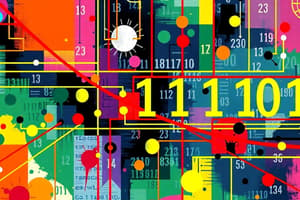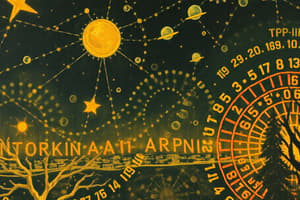Podcast
Questions and Answers
What is the Internet?
What is the Internet?
A collection of computer networks that use a protocol to exchange data.
What was ARPANET?
What was ARPANET?
The US Department of Defense network that began in the 1960s-70s.
When was e-mail born?
When was e-mail born?
1971
Who began TCP/IP in 1974?
Who began TCP/IP in 1974?
The World Wide Web (WWW) was created by Tim Berners-Lee between 1989 and 1991.
The World Wide Web (WWW) was created by Tim Berners-Lee between 1989 and 1991.
What is a web server?
What is a web server?
The _____ is the part of a website that the user interacts directly.
The _____ is the part of a website that the user interacts directly.
What does HTML stand for?
What does HTML stand for?
Which of the following is a frontend language?
Which of the following is a frontend language?
What is the main purpose of CSS?
What is the main purpose of CSS?
What does AJAX stand for?
What does AJAX stand for?
Flashcards are hidden until you start studying
Study Notes
Internet and Its History
- The Internet is a collection of computer networks utilizing protocols for data exchange.
- Originated in the 1960s-70s as ARPANET, a US Department of Defense project.
- Key technological advancements include packet switching from the 1960s.
- E-mail was introduced in 1971, and TCP/IP protocols were developed in 1974 by Vinton Cerf.
- USENET, an early Internet system, was established in 1979.
- By 1987, the Internet had nearly 30,000 hosts, showcasing rapid growth.
- The World Wide Web (WWW) was created by Tim Berners-Lee between 1989-1991.
- Major web browsers emerged: Netscape in 1994 and Internet Explorer in 1995.
- E-commerce began with Amazon.com in 1995, followed by Google in January 1996.
- Social media platforms include Wikipedia launched in 2001, MySpace in 2003, and Facebook in February 2004.
Web Technology
- Web technology encompasses tools and techniques enabling communication between devices over the Internet.
- Web browsers allow users to access web pages, displaying text, data, images, animations, and videos.
- Hyperlinks are resources accessible on the WWW through web browser interfaces.
- The WWW relies on technologies like web browsers, HTML (Hypertext Markup Language), and HTTP (Hypertext Transfer Protocol).
Web Server and Web Pages
- A web server processes user network requests and serves files to create web pages using HTTP.
- Web pages are digital documents viewable by any internet user with a web browser.
Web Development
- Involves building, creating, and maintaining websites; includes web design, publishing, programming, and database management.
- Web development is classified into two categories: frontend and backend development.
Frontend Development
- Refers to the user-interactive aspect of websites, also known as the ‘client side’.
- Key frontend languages:
- HTML: Defines the structure and links within web pages using markup language.
- CSS: Simplifies the process of styling web pages independently from HTML.
- JavaScript: A scripting language enhancing website interactivity and functionality.
- AJAX: Stands for Asynchronous JavaScript and XML, allowing server communication without page refresh.
Backend Development
- The server-side aspect of websites, not visible or interactable by users; manages data storage and organization.
Frontend Frameworks and Libraries
- Frontend development can be enhanced using various frameworks and libraries:
- ReactJS: A JavaScript library for building user interfaces.
- Next.js: A React framework for server-side rendering and static site generation.
Other Frontend Languages
- Additional languages for frontend development based on frameworks:
- Dart (used in Flutter)
- Python (used in Django)
These points outline key concepts in web systems and technologies, providing a foundational understanding necessary for further study in the field.
Studying That Suits You
Use AI to generate personalized quizzes and flashcards to suit your learning preferences.




